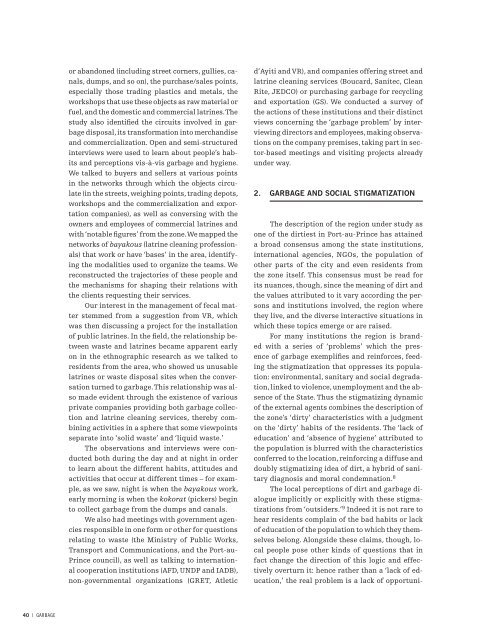déchets. stigmatisations, commerces, politiques ... - Viva Rio en Haiti
déchets. stigmatisations, commerces, politiques ... - Viva Rio en Haiti
déchets. stigmatisations, commerces, politiques ... - Viva Rio en Haiti
Create successful ePaper yourself
Turn your PDF publications into a flip-book with our unique Google optimized e-Paper software.
40 | GARBAGE<br />
or abandoned (including street corners, gullies, canals,<br />
dumps, and so on), the purchase/sales points,<br />
especially those trading plastics and metals, the<br />
workshops that use these objects as raw material or<br />
fuel, and the domestic and commercial latrines. The<br />
study also id<strong>en</strong>tifi ed the circuits involved in garbage<br />
disposal, its transformation into merchandise<br />
and commercialization. Op<strong>en</strong> and semi-structured<br />
interviews were used to learn about people’s habits<br />
and perceptions vis-à-vis garbage and hygi<strong>en</strong>e.<br />
We talked to buyers and sellers at various points<br />
in the networks through which the objects circulate<br />
(in the streets, weighing points, trading depots,<br />
workshops and the commercialization and exportation<br />
companies), as well as conversing with the<br />
owners and employees of commercial latrines and<br />
with ‘notable fi gures’ from the zone. We mapped the<br />
networks of bayakous (latrine cleaning professionals)<br />
that work or have ‘bases’ in the area, id<strong>en</strong>tifying<br />
the modalities used to organize the teams. We<br />
reconstructed the trajectories of these people and<br />
the mechanisms for shaping their relations with<br />
the cli<strong>en</strong>ts requesting their services.<br />
Our interest in the managem<strong>en</strong>t of fecal matter<br />
stemmed from a suggestion from VR, which<br />
was th<strong>en</strong> discussing a project for the installation<br />
of public latrines. In the fi eld, the relationship betwe<strong>en</strong><br />
waste and latrines became appar<strong>en</strong>t early<br />
on in the ethnographic research as we talked to<br />
resid<strong>en</strong>ts from the area, who showed us unusable<br />
latrines or waste disposal sites wh<strong>en</strong> the conversation<br />
turned to garbage. This relationship was also<br />
made evid<strong>en</strong>t through the exist<strong>en</strong>ce of various<br />
private companies providing both garbage collection<br />
and latrine cleaning services, thereby combining<br />
activities in a sphere that some viewpoints<br />
separate into ‘solid waste’ and ‘liquid waste.’<br />
The observations and interviews were conducted<br />
both during the day and at night in order<br />
to learn about the differ<strong>en</strong>t habits, attitudes and<br />
activities that occur at differ<strong>en</strong>t times – for example,<br />
as we saw, night is wh<strong>en</strong> the bayakous work,<br />
early morning is wh<strong>en</strong> the kokorat (pickers) begin<br />
to collect garbage from the dumps and canals.<br />
We also had meetings with governm<strong>en</strong>t ag<strong>en</strong>cies<br />
responsible in one form or other for questions<br />
relating to waste (the Ministry of Public Works,<br />
Transport and Communications, and the Port-au-<br />
Prince council), as well as talking to international<br />
cooperation institutions (AFD, UNDP and IADB),<br />
non-governm<strong>en</strong>tal organizations (GRET, Atletic<br />
d’Ayiti and VR), and companies offering street and<br />
latrine cleaning services (Boucard, Sanitec, Clean<br />
Rite, JEDCO) or purchasing garbage for recycling<br />
and exportation (GS). We conducted a survey of<br />
the actions of these institutions and their distinct<br />
views concerning the ‘garbage problem’ by interviewing<br />
directors and employees, making observations<br />
on the company premises, taking part in sector-based<br />
meetings and visiting projects already<br />
under way.<br />
2. GARBAGE AND SOCIAL STIGMATIZATION<br />
The description of the region under study as<br />
one of the dirtiest in Port-au-Prince has attained<br />
a broad cons<strong>en</strong>sus among the state institutions,<br />
international ag<strong>en</strong>cies, NGOs, the population of<br />
other parts of the city and ev<strong>en</strong> resid<strong>en</strong>ts from<br />
the zone itself. This cons<strong>en</strong>sus must be read for<br />
its nuances, though, since the meaning of dirt and<br />
the values attributed to it vary according the persons<br />
and institutions involved, the region where<br />
they live, and the diverse interactive situations in<br />
which these topics emerge or are raised.<br />
For many institutions the region is branded<br />
with a series of ‘problems’ which the pres<strong>en</strong>ce<br />
of garbage exemplifi es and reinforces, feeding<br />
the stigmatization that oppresses its population:<br />
<strong>en</strong>vironm<strong>en</strong>tal, sanitary and social degradation,<br />
linked to viol<strong>en</strong>ce, unemploym<strong>en</strong>t and the abs<strong>en</strong>ce<br />
of the State. Thus the stigmatizing dynamic<br />
of the external ag<strong>en</strong>ts combines the description of<br />
the zone’s ‘dirty’ characteristics with a judgm<strong>en</strong>t<br />
on the ‘dirty’ habits of the resid<strong>en</strong>ts. The ‘lack of<br />
education’ and ‘abs<strong>en</strong>ce of hygi<strong>en</strong>e’ attributed to<br />
the population is blurred with the characteristics<br />
conferred to the location, reinforcing a diffuse and<br />
doubly stigmatizing idea of dirt, a hybrid of sanitary<br />
diagnosis and moral condemnation. 8<br />
The local perceptions of dirt and garbage dialogue<br />
implicitly or explicitly with these stigmatizations<br />
from ‘outsiders.’ 9 Indeed it is not rare to<br />
hear resid<strong>en</strong>ts complain of the bad habits or lack<br />
of education of the population to which they themselves<br />
belong. Alongside these claims, though, local<br />
people pose other kinds of questions that in<br />
fact change the direction of this logic and effectively<br />
overturn it: h<strong>en</strong>ce rather than a ‘lack of education,’<br />
the real problem is a lack of opportuni-


